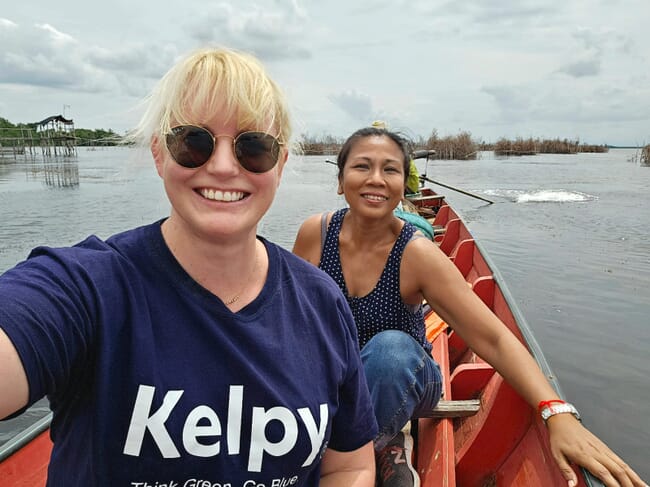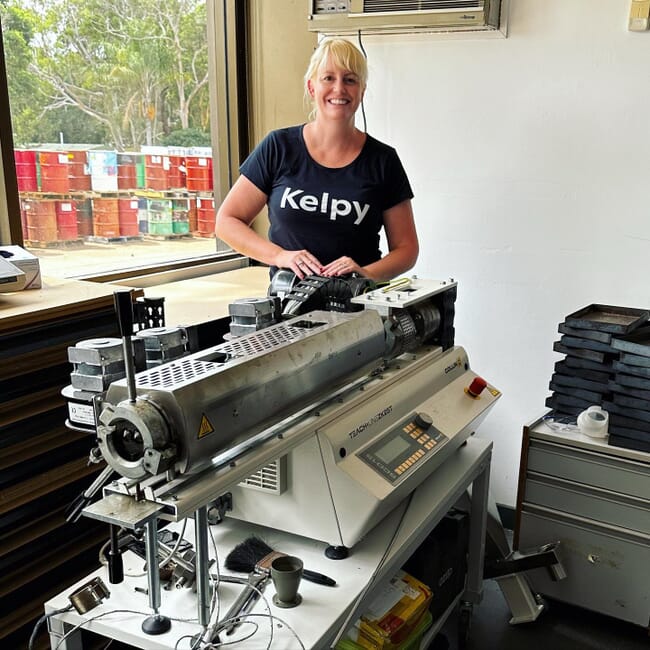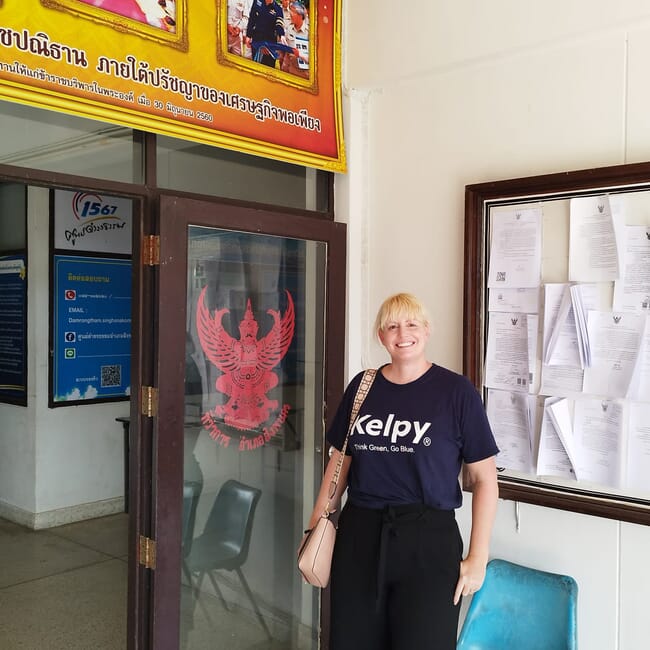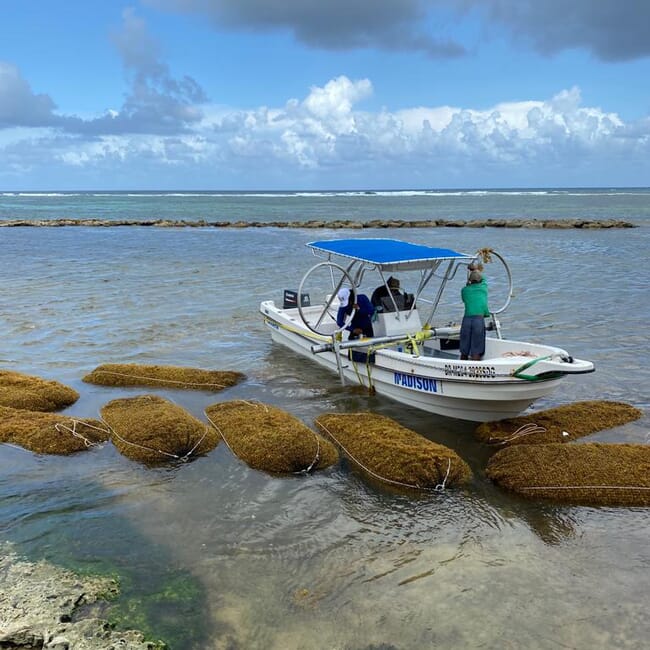
© Kelpy
What inspired you to start your own seaweed processing company?
I founded Kelpy in 2021, having been displaced from Sydney as a family as Covid collateral damage, we were left jobless with nowhere to live. Not being from NSW, we'd spent one weekend exploring the state with a visit down to Jervis Bay with our four daughters. This is where we landed, in a community that wrapped us up immediately and we now call home. It was during this time that I decided to go back to my roots – my father was a fisherman and one of Western Australia’s aquaculture pioneers – and find a way to restore coastal communities and generate sustainable and regenerative jobs, for women in particular.
I’d watched the film 2040, directed by Damon Gameau, three times and the more I researched, the more I understood that seaweed holds the key to transforming the lives of coastal communities everywhere, particularly those at the coalface of climate change. I submitted an application to Climate-KIC Australia and quickly learned that any innovation needs to be commercially successful on a global scale if the environmental and social impacts are to be realised. So, working to replace something as prolific on a worldwide spectrum as plastic became a key aim.
Another goal is to uplift millions of women with our new blue economy value chain. Up to 90 percent of seaweed farmers are women in developing nations. With the decline of fishing industries everywhere, the women are becoming the new breadwinners in their communities. Kelpy is building the demand for seaweed farming at scale. Our innovation utilises seaweeds from all over the world. Invasive, low grade and newly farmed seaweeds, creating industry where there was none. I see seaweed farming as having limitless potential for these women.
What’s the business model?
We sell seaweed-based Kelpy Pellets to manufacturers (B2B) per tonne for conversion into flexible, medium and rigid plastic replacement products. These products are validated in advance directly with brand partners within paid pilots.
The pellets are made from a broad range of seaweeds, with a focus on bioremediation waste streams (such as farmed ulva); invasive species (such as Caribbean Sargassam); and seaweed that is regeneratively farmed with our global supply partners. With pressure on high value, food grade seaweed we're focused on developing new opportunities for lower grade seaweeds, thereby enhancing the economic uplift for communities stricken by declining fishing industries and post-Covid downturns.
Our polymer process begins with low energy pre-processing of seaweed: solar drying and milling into a fine powder. We're finding the necessary processing equipment exists already in agriculture. Our polymer scientists then use a semi-refinement process and blend with bio-based additives to achieve a spectrum of use cases embodied in our pellet formulation. We don't use any fossil fuel-based elements or rely on PLA [polylactic acid]. Any bio-based inclusions are also sustainably sourced from non-food-grade streams, as food security is front of mind for our team. Our dispersed manufacturing model means we can localise our value chain using seaweeds and agri-waste from local environments and create jobs – from ocean farming, to manufacturing in-country. The pellets are a drop-in solution for plastic manufacturers using existing moulds and equipment. The finished product is compostable, marine degradable and food safe, while meeting the exacting standards for consumers and industry.

© Kelpy
What have the key milestones been to date?
- Establishing a world class international team with a shared vision for a more equitable world.
- Participating in consumer brand trials with eco and purpose-driven brands, as well as highly visible multinational corporations.
- Validating the use of low-grade seaweeds from all over the world
- Partnership agreements with ethically aligned capability partners in Australia, New Zealand, Europe, South Asia, SE Asia, Fiji and the Caribbean.
- Being selected for three government-led product innovation challenges in Australia and to attend NYC Climate Week, alongside the NSW Government.
- Being named as one of Australia’s Cicada Innovations 2023 Deeptech Founders.
- Receiving endorsement from international governments for our projects in light of the socio-economic uplift we can empower.
What are the main challenges that still need to be overcome?
Our pellets are a drop in solution for plastic manufacturers. A bottleneck for us has been navigating the value chain from brand partner back to converter and gaining access to high volume facilities between production runs. Until we have significant scale and begin transitioning entire plants, this will remain a sticking point. In the meantime, we’re working on acquiring our own converting equipment to speed up our numerous product trials.

© Kelpy
Why do you think bioplastics are the most promising application for seaweed?
I think the scale of the plastic problem will be the lever that drives significant growth in the regenerative seaweed farming ecosystem. I don’t think it is the most promising use other than scale. As we know seaweeds are utilised for their unique properties in the fields of food, pharmaceutical, nutraceutical, cosmetics and fertilisers. First Nations cultures all over the world have a long history of traditional knowledge and uses of seaweeds, which has resulted in a deep cultural connection to place and generations of knowledge sharing. Seaweeds also play a vital role in cleaning the ocean, drawing down carbon and providing essential habitat for juvenile aquatic species. I believe the commercialisation of seaweed bioplastics and subsequent investment in infrastructure, research and education will unlock outcomes in all the areas mentioned above. Particularly with purpose-driven leaders at the front of this evolving industry.
What makes Kelpy unique?
We’ve taken an ecosystem and end-to-end value chain approach to our innovation. With this mindset, our team has embedded principles that have guided our journey to date. How we source and implement our scale-up has been as important as the solution itself. This means we’ve gone global, only working with seaweeds that are in abundance, ethically and sustainably sourced.
We’ve also developed a hub and spoke model with our trusted capability partners, enabling seaweed processing and manufacturing to occur in countries where the seaweed is sourced. This unlocks socio-economic uplift for the world’s poorest nations, with women farmers the common denominators.
We’ve also ensured a clean, low energy production line without the need for costly, multi-staged processing as seen with PHA and pure polymer extraction. By using waste stream seaweeds and emerging lower quality varieties, we aren’t competing with seaweeds earmarked for food and other high-grade products. We’ve successfully validated invasive sargassum from the Caribbean and bioremediation seaweeds from Australian and international aquaculture operations. Kelpy also regularly collaborates with other innovators in the field to maximise the value of seaweed yields. Fractionating market streams by coordinating high value extractions prior to our process with the remaining biomass to generate our materials.

Kelpy has partnered with SOS Carbon in the Caribbean to develop a seaweed polymer solution utilising the invasive influxes of Sargassum inundating the region each year – the company has successfully created resins for both flexible and rigid plastic replacement products from the invasive algae © Kelpy
Who are the partner organisations / businesses that you work with?
I founded Kelpy with the support of my husband and daughters. Through my international customer discovery journey, cold calling world leading experts, scientists, seaweed farmers, corporations, regulators and so on, I was lucky enough to find my polymer science experts, processing engineers and commercial team, as well as an incredible pool of project partners. We are working on aligned projects with SOS Carbon in Dominican Republic; Origin By Ocean, in Finland; AgriSea in New Zealand; Mwani in Zanzibar; Coast 4C in the Philippines; OceanFarmr in Australia / USA; SoftSeaweed in Norway; Metal Production in Lithuania; Sirputis in Norway, VL Green Hub in India; Bio-Ingredients in Bangladesh; Eco Pacific in Fiji; Macro Oceans in Canada; and South Coast Seaweed in Australia.
How have you funded the business so far and are you looking for further funding?
Kelpy has been a largely bootstrapped venture, with a small investment from the Startmate Accelerator Program of AUD$120,000 (US$77,000) and a matched minimum viable product grant from the NSW Government totalling AUD$8,200 (US$5,200)
Our commercial pilots have been funded directly by our brand customers. We are in the midst of our first significant raise right now with purpose driven investors.
Where would you like Kelpy - and yourself - to be in 10 years time?
I envision Kelpy Hubs all over the planet, with a decentralised approach to production. Dispersed manufacturing and education hubs empowering communities, with an emphasis on elevating women in disadvantaged regions. We will have best practice farming partners ensuring a climate resilient and biodiverse future for the industry. Our zero-waste model and cooperative approach to R&D will unlock boundless seaweed-derived solutions for the planet benefitting health, cultural heritage, well-being, environmental sustainability and food security. Personally, I’d like to be working closely on our mission and purpose, creating a more equitable world, democratising education and empowering generations to come with the tools to build a world aligned with nature.




